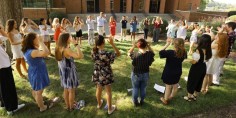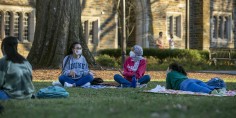Since 2013, Molly has served as project director for a four-campus research-practice partnership studying student resilience and well-being. Funded by a $3.4 million grant from The Duke Endowment, the study includes Davidson College, Duke University, Furman University and Johnson C. Smith University.
It began with data collection across the four campuses to understand the causes of student stress, how stress manifests itself, what tools help students, and where interventions are most needed. Using that data, gathered from the Class of 2018 over four years, campus teams are now looking for patterns and trends. Researchers and practitioners are also in the early stages of designing and implementing new ways to enhance resiliency.
The study is not about removing knots in students’ lives or erasing their sources of stress. Instead, Molly says, “it’s about understanding what we can do as researchers, faculty members and practitioners to help students develop the skills to deal with those obstacles and stressors – both in college and then independently as they move on.”
For Molly, the project has been a chance to dig deep into a topic that she’s passionate about. After studying psychology at N.C. State University and earning a Ph.D. in developmental psychology at Duke, she has been researching social development in childhood, adolescence and early adulthood. Her special interest is the college years.
“Friendship is among the strongest predictors of both loneliness and belonging in college, and feelings of belonging are a key factor in understanding student success and persistence,” she says. “The exciting piece of the resilience project is being able to use research to understand the challenges that students face, and then to use those findings to inform practices that will help them develop healthy and fulfilling lives in college and beyond.”







